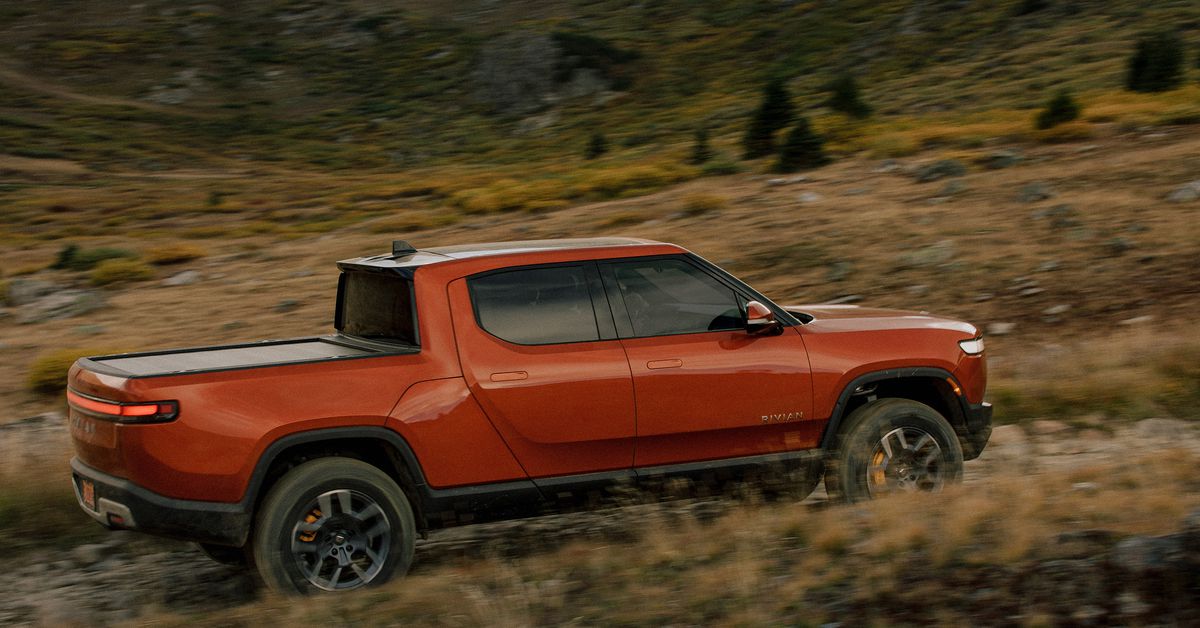
Electric vehicle startup Rivian is now a publicly traded company after executing one of the biggest initial public offerings in history. Rivian shares started trading on the Nasdaq stock exchange Wednesday at around $78 per share. That gave Rivian an overall valuation of nearly $80 billion and helped it net $12 billion in fresh cash, despite the fact that it only just recently started to make and ship its first electric pickup trucks.
It’s the sixth-largest IPO ever on a US stock exchange, according to Bloomberg, and it’s hard to imagine the company picking a better time to debut. Tesla has generated an incredible amount of interest in electric vehicles and is now one of the most highly valued companies in the world. The public markets have also been on an outrageous run over the last few years — a run that was supercharged over the last 18 months by an influx of retail traders and a boom in electric vehicle companies going public.
Rivian, which has a steady CEO and founder and relatively modest goals for the next few years, could be a good test of all that hype. It has received a little more than 55,000 preorders for its pricey electric pickup truck (the R1T) and SUV (the R1S) and has said it won’t be able to deliver all of those until the end of 2023. Where other EV startups went public with big promises of near-term growth, Rivian has been very conservative in the few estimates it’s offered for what the next few years look like and has instead emphasized that it will be largely focused on making vans for Amazon, which owns about 20 percent of the startup.
And yet, shares of Rivian jumped to $106 as they began trading on the Nasdaq exchange Wednesday and climbed from there, lifting the company’s valuation well over $100 billion — higher than all other automakers on the planet, save for Tesla, Toyota, Volkswagen, and China’s BYD.
Rivian’s eye-watering valuation will likely reinforce lazy comparisons to Tesla, despite the fact that the startup is beginning production at a time when there’s an observable desire for electric vehicles — which wasn’t the case when Tesla started out, to put it mildly. And while many will likely view Rivian’s valuation as a prime example of how hot the stock market is, at least one legacy automaker has already tried to make the case that it’s justified: General Motors CEO Mary Barra said Wednesday that Rivian’s valuation proves that older automakers are “so undervalued.” (GM nearly had a deal in place to become a major investor in Rivian in 2019 before the startup backed out and took on money from its crosstown rival, Ford.)
Either way, the splashy debut is sure to draw a lot of attention to the startup and its electric vehicles. It has also provided Rivian with a crucial windfall, as it needs a lot of money to grow — and survive — in the notoriously cash-hungry automotive business. Rivian lost $994 million in the first six months of 2021 alone and has said in regulatory filings that it expects to spend another $8 billion by the end of 2023.
The startup wants to make as many as 1 million vehicles per year by 2030 and says it will have all three different vehicles in production by the end of this year. It plans to sell non-delivery versions of its van to other customers within the next two years. It’s even searching for a location to build a second factory in addition to the one it operates in Normal, Illinois. And it’s already carrying a staff of nearly 10,000 employees.
Originally founded in 2009, Rivian spent nearly a decade operating in stealth mode. CEO and founder RJ Scaringe initially wanted to make an electric sports car more or less similar to the Tesla Roadster. But he nixed that plan along the way and shifted the company toward developing an electric pickup truck and an SUV. The R1T and R1S, as they’re respectively called, made their debut at the 2018 LA Auto Show.
Rivian’s profile started to take off shortly after. In early 2019, it announced a $700 million funding round led by Amazon and then a $500 million investment from Ford. Later that year, Amazon announced it was helping Rivian develop an electric delivery van and that it was ordering 100,000 of them from the startup, marking what would be the largest single purchase of electric vehicles in history.
Now, with its pickup trucks starting to hit the road and the van and SUV soon to follow, Rivian has become something that is still rare in the industry: a publicly traded EV company with actual vehicles to sell. That’s something that startups like Faraday Future, Canoo, Fisker Inc., Lordstown Motors, and Nikola — which all went public within the last year-and-a-half — are still months away from being able to say.
https://www.theverge.com/2021/11/10/22774403/rivian-ipo-debut-evs-12-billion-amazon-tesla-valuation

